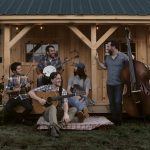FOUNDERS’ KEEPERS: Watchhouse, Office Dog, Martin Zellar, and More

Watchhouse (photo by Shervin Lainez)
Yes, it’s 2024, but I’ll confess: I keep writing 2023 on my music playlists. Which is to say that alongside two January releases in this month’s Founders’ Keepers batch are four records from the latter part of last year that I hadn’t yet gotten around to writing about, but that deserve not to get lost in the new year shuffle. They include a couple of songwriters I first heard three decades ago, plus two favorites from my more recent tenures in Austin, Texas, and Durham, North Carolina. But first, let’s check out the new stuff.
Watchhouse — Austin City Limits Live at the Moody Theater
This set from the North Carolina band formerly known as Mandolin Orange is technically not “new” — they recorded these 15 songs onstage in January 2020, just before the pandemic hit. I was at the show, and it felt like a culmination of a long journey for both the band and me. I was living in North Carolina’s Triangle region when Andrew Marlin and Emily Frantz first began kicking around the small clubs in Carrboro. By the time I headed to Austin in 2014, they were on the rise, and over the next few years I saw them a half-dozen times at gradually bigger venues: the small rooms at Mohawk and Stubb’s, then Holy Mountain and the Parish, then ACL Fest and Old Settler’s Fest. By the time they got to ACL Live, they were half a dozen strong, fleshing out early duo arrangements with an ace crew that included multi-instrumentalist Josh Oliver plus the rhythm section of Joe Westerlund and Clint Mullican, along with opener Kate Rhudy guesting on a couple tracks. Highlights include standout tracks from prior albums such as “There Was a Time” (from 2013’s This Side of Jordan), “Jump Mountain Blues” (2015’s Such Jubilee), “Echo” (2016’s Blindfaller) and the album-opening “Golden Embers” (2019’s Tides of a Teardrop). The band first issued this live set on Bandcamp during the pandemic’s lockdown months, but its quality warrants the full release Yep Roc gave it on Jan. 12.
Office Dog — Spiel
Nobody would mistake this New Zealand power trio for an alt-country band — but on the other hand, they’re one of those indie acts (like their countrywomen The Beths, or maybe Guided By Voices) that roots-music devotees often gravitate toward. The guitars are drenched in fuzz, while the rhythm section reverberates with grit and clamor … and yet beneath it all are distinct songs and melodies that may reel in Americana fans who dig the harder-edged fringes of the genre. Some of this recalls the 1990s heyday of Red House Painters, a California crew that brilliantly balanced beauty and damage. Pre-release videos for “Big Air” and “The Crater” provide a good sense of Office Dog’s aesthetic, though it’s the comparatively subtle track “Warmer” that has captivated me the most. Leader Kane Strang previously issued several solo records on New Zealand’s influential Flying Nun label, but he teamed with drummer Mitchell Innes and bassist Rassani Tolovaa on both the writing and recording of these dozen tracks released Jan. 26 from New West.
Martin Zellar — Head West
After early acclaim as the frontman for Gear Daddies, that little ol’ band from Austin — Minnesota, that is — Martin Zellar began releasing albums under his own name in the mid-1990s. Those records largely have flown under the radar, even as Zellar became a cult hero for writing “I Wanna Drive the Zamboni,” a hidden track on a Gear Daddies album that gradually became ubiquitous in hockey rinks across North America. Some of those records deserved a broader hearing than they got, especially Rooster’s Crow, recorded just outside the other Austin (Texas) with a mostly Lone Star cast that included Kelly Willis and Lloyd Maines. Head West, released in August, was made mostly in Zellar’s adopted hometown of San Miguel de Allende with a crew that includes former Gear Daddies Nick Ciola and Randy Broughten plus Zellar’s sons Wilson and Owen. A standout contributor is Presley Haile, who sings lead on “Better Off Apart” and gently duets with Zellar on “Boats Slowly Sinking.” More female-vocal counterpoints come from Ali Gray on “We Ran Wild,” the title track, and the tender album closer “40 Years Along,” which glistens with Geoff Queen’s exquisite pedal steel runs.
Droge & Summers Blend — Volume Three
From his early days fronting Seattle proto-alt-country band Ramadillo, through several major-label albums under his own name in the 1990s, to the 2002 all-star trio The Thorns, and to an increased focus on producing other artists, Pete Droge has been one of the Northwest’s most prominent musicians for decades now. In recent years, he and his wife, Elaine Summers, have compiled a series of “Droge & Summers Blend” releases that combine newer material with rediscovered demos and alternate takes of previously issued tunes. Some rather prominent names pop up on the sessions, including drummers Jay Bellerose, Matt Chamberlain, and the late Bill Rieflin, as well as Northwest mainstays Paul Brainard (pedal steel), Scott Weddle (guitar), and Nova Devonie (accordion). The one new track here, “Big Time Dream,” is an instantly charming upbeat folk-rocker. Several tracks were initially written for film/TV soundtracks or scores, including “Two of the Lucky Ones” and “Northern Lights,” the latter of which is revisited with an instrumental version to close the album. If you want to hear the first two in the series, there’s also a new “Volumes 1-3” set featuring all 23 songs.
Croy & the Boys — What Good’s The Medicine?
Austin band Croy & the Boys is ironically named on two fronts: First, Croy’s real name is Corey, and second, a key member of the Boys is female bassist Amy Hawthorne. Whatever you call them, they’ve been one of Austin’s best roots bands since their auspicious 2016 debut produced by Black Pumas’ Adrian Quesada. On What Good’s The Medicine, leader Corey Baum at times sounds more like a coffeehouse troubadour than the barroom honky-tonker he’s been in the past, allowing for subtler colors to shine with stripped-down arrangements on several songs — though he still kicks up dust on occasion, most notably the mid-album rocker “I Get By.” Lyrically, Baum’s calling card is insightful observations about the working class, and that continues here with “Damn the Working Man” plus the closing tracks “Throw ’Em Out” and “I Know About No Money.” Released digitally last August, What Good’s The Medicine will be available on vinyl in March from Spaceflight Records.
Jason Kutchma — Wishing Well
I first got to know Kutchma around a dozen years ago in Durham, where his anthemic indie-rock band Red Collar was giving way to a more Americana-focused string of solo releases. A peripatetic sort, Kutchma has gradually headed west since then, first to Idaho (where he ran for political office) and then to Oregon, where he started recording these tracks a couple of years ago. A hand injury forced him to abandon guitar as his primary instrument, but sometimes necessity is the mother of invention. Kutchma bought a cheap thrift-store keyboard and recorded these eight songs at home, crafting a fresh sound that’s far more pop-oriented than anything he’d done previously. The common thread is Kutchma’s booming voice, which sounds stronger and more confident than ever on tracks such as the near-disco “The Love Divine” and the urgent new-wavish rocker “Till the Wheels Fall Off.”




